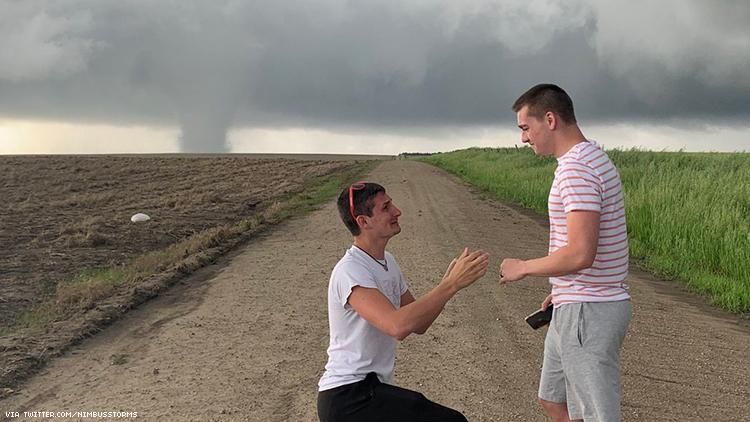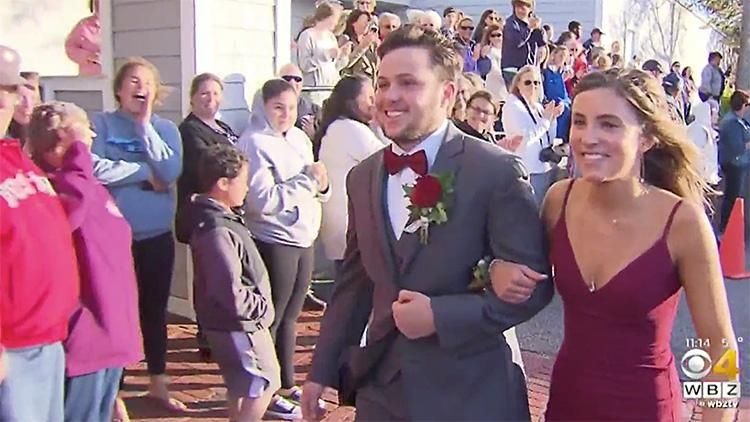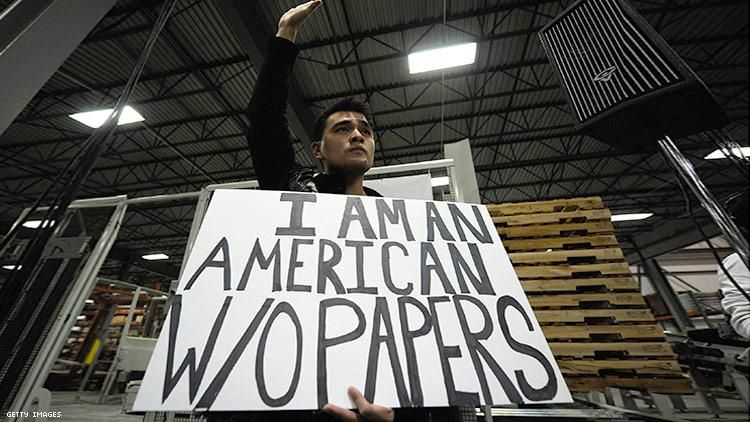Gay ‘Twister’ Fan Gets His Dream Proposal

If they don’t get to the storm cellar soon, they could end up “over the rainbow.”
www.advocate.com/news/2019/5/29/gay-twister-fan-gets-his-dream-proposal
Gay ‘Twister’ Fan Gets His Dream Proposal

If they don’t get to the storm cellar soon, they could end up “over the rainbow.”
www.advocate.com/news/2019/5/29/gay-twister-fan-gets-his-dream-proposal
Storm Chaser Proposes to Boyfriend Alongside Kansas Tornado
Joey Krastel, a meteorologist and risk analyst for the Maryland Emergency Management Agency, proposed to his boyfriend Chris Scott in Kansas as a tornado loomed in the distance. The photo of the proposal is quickly going viral.
The 2 loves of my life pic.twitter.com/Cv4eviechZ
— Joey Krastel (@NimbusStorms) May 29, 2019
NBC News reports that the couple met on Instagram, thanks to their shared love of extreme weather: ‘On Tuesday, Krastel, Scott and two of their mutual friends set out to catch a tornado in Kansas, a tornado that inspired the National Weather Service to issue a “tornado emergency” for several counties in the state, as well as the Kansas City metropolitan area. The group began their tornado watch in Salina, Kansas, and winded up following the storm to Tipton, where Krastel popped the question. “It all just kind of came together and happened so quickly,” Krastel said. “I was like ‘OK, this is it.’”‘
The post Storm Chaser Proposes to Boyfriend Alongside Kansas Tornado appeared first on Towleroad Gay News.
PHOTOS: Behind the scenes at International Mr. Leather 2019
Congratulations to Jack Thompson, named International Mr. Leather 2019 at the annual competition in Chicago, Ill. Thompson is the first trans person of color to win the title, and after an inspiring speech and a confident showing through the competition, the win was well-deserved.
Three Ways to Combat Mental Health Stigma in LGBTQ Communities

As Mental Health Awareness Month comes to a close, we must reaffirm our commitment to have open, honest discussions about the impact of mental health disparities on the LGBTQ community.
LGBTQ people are nearly three times as likely as others to experience a mental health condition such as anxiety or a mood disorder, according to the National Alliance on Mental Illness.
And for bisexual and transgender people, as well as those living at the intersections of multiple marginalized identities, those numbers are even higher.
Breaking the silence about these issues is a key step to reducing stigma and empowering each other to seek help and support when needed.
Here are three ways you can help:
1. Provide a shoulder for someone to lean on.
Many LGBTQ people experience family rejection, bullying and harassment, or feel unsafe in their communities for simply being who they are, all of which can be added risk factors for anxiety and mood disorders. It can feel incredibly isolating not knowing whether there’s someone in your corner willing to listen, love and support you exactly as you are.
2. Work for equality in your community.
Breaking down the barriers LGBTQ people face takes more than the support of friends and family. Laws and legislation must reflect the lived experiences of LGBTQ people and provide a supportive, inclusive infrastructure so that everyone is able to seek appropriate care and can feel safe in their homes, schools and workplaces.
3. Share your story.
Sharing our experiences is a powerful way to chip away at the bias, discrimination and rejection that place LGBTQ people at high risk of compromised mental health. Our stories can show others that they are not alone in their struggles and that there is hope and a community to support you when things seem dark.
If you are struggling, check out Mental Health America’s screening tool to take confidential mental health screenings and learn more about potential treatment options.
Your story matters, and you are not alone.
Catching up with ‘Halston’ director Frédéric Tcheng

©Berry Berenson Perkins
Documentaries about icons in the fashion industry have been in vogue ever since Valentino: The Last Emperor became a huge hit in 2008. In recent years, there have been a slew of features about larger-than-life designers, ranging from McQueen and 7 Days Out (Karl Lagerfeld), to Jeremy Scott: The People’s Designer and Dior and I.
The latter was the most recent directorial effort from Frédéric Tcheng, who has now directed the new doc Halston, a peek behind the scenes at the life of the legendary late American designer. Halston was one of the biggest hits at this year’s Sundance Film Festival and is now rolling out nationwide for audiences to see on the big screen.
America’s first superstar designer, Halston rose to international fame in the 1970s, creating an empire and personifying the dramatic social and sexual revolution of the last century. Reaching beyond the glamour and glitz, Tcheng’s documentary reveals Halston’s profound impact on fashion, culture, and business, capturing the epic sweep of the life and times of the legendary designer who set women free with his unstructured designs and strove to “dress all of America.”
Framing the story as an investigation featuring actress and writer Tavi Gevinson as a young archivist diving into the Halston company records, Tcheng expertly weaves rare archival footage and intimate interviews with Halston’s family, friends, and collaborators including Jacqueline Kennedy, Liza Minnelli, Andy Warhol, and Iman. What results is a behind-the-headlines look into the thrilling struggle between Halston’s artistic legacy and the pressures of big business.
GLAAD caught up with Tcheng to ask him a few questions about the impetus behind his latest behind-the-scenes look at fashion greatness.
Why did you choose to make this documentary about Halston?
When I started reading about Halston, it was the business story that completely pulled me in. I didn’t know how Halston had lost control of his company in 1984. My knowledge of Halston before that had been fairly limited, mainly about Studio 54, which is a common misperception. But the business story was astonishing. First, from a story standpoint – it was like a thriller – but also on a personal level, it resonated with me. After Dior and I, I was at a point in my career where I’ve had experiences with corporations that were pretty traumatic and made me realize how small a person can be versus the bottom line. Halston’s story offered me a way to address somehow the logic of financial capitalism. Financial markets rule the world we live in. And I think in many ways it all started in the 1980s with Reagan’s deregulations and the rise of huge conglomerates. That’s why I was fascinated by Halston’s struggle against the corporation in 1983. I saw all of these forces at play in a very powerful way. You can even see the beginnings of globalism and China’s awakening.
But Halston’s story is so vast. When I started to assemble the film, other important themes came forward, like the place of LGBTQ people in the ’60s, or the relationship between images and reality. There are so many layers to his story.



(L to R) Pat Cleveland, Chris Royer, Halston, Alva Chinn, Karen Bjornson
Halston remains one of the most iconic names in fashion. How do his life and work resonate today, culturally speaking?
His legacy is all around us, whether we realize it or not. Halston’s contribution is huge. He put America on the map in the 1970s. And from the design standpoint, minimalism is probably the single most influential movement in modern fashion history. And Halston was at the forefront of it. From a business standpoint, his partnership with JCPenney laid the groundwork for the way fast fashion operates today. He was reviled for it, but today others are reaping the benefits of his ideas. And lastly, I think his mastery of image-making and self-branding was so ahead of its time. We see it play out in our era with Instagram, and everyone projecting a curated image of themselves through social media. He was doing that at his own scale back in the 1970s. He was the first influencer.
Halston seemed to have kept his work, personal, and family lives all very separate. To you, who was Halston? How do you describe him?
That’s true. I think a lot of people of that generation approached privacy very differently than we do. He didn’t “come out” but he wasn’t hiding his relationship to his boyfriend Victor Hugo either. Many people knew. They were out in public at Studio 54 every other night. Victor was on the runway, or front row regularly.
But Halston was an intensely private person. He refused to talk about his family for instance or his upbringing. He was always very vague about things that distracted from the persona he had created.
The documentary frames Halston as an iconic figure who has been erased from history. Can you describe the process you had for unearthing this history?
(pictured right: Anjelica Huston and Halston)
His legacy has been actively erased by the corporation. They erased their video archive and divested the dresses that he had kept over the years. So the research we had to do was extensive, probably the most extensive I’ve ever done. And I must say that it was for me the most exciting part of the process. In a way, making the film quickly became a full-blown investigation. Our producers were relentless in pursuing footage and photos that had never been seen before. One of our biggest discoveries was recovering the raw tapes of an NBC documentary about Halston in China that never aired. The tapes were thought to be lost for 30 years but finally turned up after many searches.
We also had more than a thousand pages of memos. It was like reading a great detective novel. They detailed the day-by-day conflicts raging at Halston Enterprises. You begin to see two very different narratives emerge: Halston’s and the corporation’s. And I became obsessed with finding out the truth.
It’s interesting to see Halston’s shift from becoming one of the first American designers revered internationally… to striking a deal with JCPenney. Through your research, do you believe you gained insight into his goals and intentions? If so, what were they?
I think his goal was to very simple. It was to go as high as he could and grow constantly. So by 1982, he literally wanted to “dress everybody in America.” I didn’t want to cast Halston simply as a victim. His story has been told mainly as a cautionary tale, but people need to remember that through his association with the Norton Simon corporation, he achieved unprecedented success and creative freedom. He took a risk to do something no one else had ever done at that time. It may have been a Faustian bargain, but in the process, he became “Halston.”
As Liza Minnelli sings in the film: “Nothing’s gained if there’s nothing tried.” Halston definitely tried. He worked very, very hard. There was something deeply inspiring and life-affirming to me about Halston’s fearlessness: he was the first to defy European hegemony on fashion, the first to go mass market with JCPenney, the first designer to visit Communist China, and the list goes on. So I hope the audience is emboldened into “trying,” in whatever shape or form.
Was there anything that surprised you during the process making this documentary?
I never knew that Halston had been such a counterculture force in the early 70s. Most people remember the Studio 54 persona, and we forget the man who put models of color on the runway or chose the plus-size Andy Warhol superstar Pat Ast as a muse. He was a force for inclusivity and change. And his clothes reflected that. They liberated women from the constraints and structure of European couture.
How do you think Halston resonates today for the LGBTQ community… and for culture at large?
Halston’s journey as a gay man was very very important to me personally because it reflects the incredible journey of the gay community at large from the 60s to the 80s. He was a small town boy coming to New York to find a safe haven. He was part of the Fire Island community. He suffered Pre-Stonewall homophobia, he helped create a new society in the 70s with places like Studio 54, and eventually, he was taken by AIDS in the 80s, his family bravely deciding to be transparent about the disease at a time when it was stigmatized. It’s an extraordinary journey through America’s queer history.
‘Halston’ is now playing in theaters in New York City and opens in Boston and Los Angeles this weekend. It will premiere later this year on CNN.
www.glaad.org/blog/catching-halston-director-frederic-tcheng
Trans Teen Crowned Prom King of His Cape Cod High School

Nick Bulman, who was chosen as prom king from five nominees, said that students at Barnstable High School have been supportive since he came out as trans.
www.advocate.com/transgender/2019/5/29/trans-teen-crowned-prom-king-his-cape-cod-high-school
Here’s Pete Buttigieg’s response to Mueller statement that charging Trump was ‘not an option’
Brian Jordan Alvarez, Mitch McConnell, Chick-Fil-A, Randy Rainbow, Alex Trebek, Brady Bunch, Mathew V: HOT LINKS
CHICK-FIL-A. FAA investigating bans on Chick-Fil-A at airports in San Antonio, Texas, and Buffalo: “FAA’s Office of Civil Rights has notified the San Antonio International Airport (SAT) and Buffalo Niagara International Airport (BUF) that it has opened investigations into these complaints. The FAA notes that federal requirements prohibit airport operators from excluding persons on the basis of religious creed from participating in airport activities that receive or benefit from FAA grant funding.”
OH, WE’D FILL IT. Mitch McConnell on the potential of an election year Supreme Court seat. ‘The leader took a long sip of what appeared to be iced tea before announcing with a smile, “Oh, we’d fill it,” triggering loud laughter from the audience.’
STEVE BANNON. On Trump’s finances: “This is where it isn’t a witch hunt – even for the hard core, this is where he turns into just a crooked business guy, and one worth $50m instead of $10bn. Not the billionaire he said he was, just another scumbag.”
WINTER HAS COME. Jon Snow is in rehab.
RANDY RAINBOW. Our favorite musical political commentator gets a thorough profile in the Washington Post. “He’s like Brecht meets Jerry Herman,” offers Broadway director Michael Mayer, comparing Rainbow to the 20th-century German playwright and the composer-lyricist of “Hello, Dolly!” “Always dead-on. Always dead funny.”
ALEX TREBEK. The Jeopardy host’s pancreatic cancer tumors have shrunk by 50 percent: “I’ve got a couple million people out there who have expressed their good thoughts, their positive energy directed towards me and their prayers. an just the chemo, and they agreed it could very well be an important part of this.”
BIG DONATION. Egg Boy gives back: “The Australian teenager who smashed an egg onto the head of Fraser Anning says he has donated more than $100,000 to the survivors of the Christchurch terrorist attack.”
DIONNE WARWICK. Beyoncé has “a long road” to becoming a true icon: “I love her to death and can appreciate her talent. But that iconic status?”
GONE. Last male Sumatran rhino in Malaysia dies: “The rhino once roamed across much of Asia, but has now almost disappeared from the wild, with fewer than one hundred animals believed to exist.The death of Tam, who lived at a wildlife reserve on the island of Borneo, was announced on Monday. A female called Iman is now the only remaining member of the species in Malaysia.”
PSA OF THE DAY. We want you to understand this important message.
RENOVATION OF THE DAY. The Brady Bunch house.
FED UP OF THE DAY. Meteorologist goes off on viewers complaining that The Bachelorette got interrupted by a tornado warning.
TRAILER OF THE DAY. Swamp Thing.
MUSIC VIDEO OF THE DAY. Mathew V “Flashback”.
Says Mathew V: “Writing this song was one of the hardest things I‘ve had to do in my life. I wrote this song about my experience with sexual violence/rape at seventeen years old, and how that situation has influenced and affected my life today. It was something that I always knew I had to process, and had always avoided. But with every new song I wrote, I still had this in my closet, this weight on my chest. I worked on this song with Luca Fogale who is an amazing artist in his own respect, and one of my best friends. I had opened up to him about this aspect of my life in the past, and he felt like a very safe space for me to turn to with these feelings. I know that when I went through what I did, I felt so ashamed and alone. I felt like I couldn’t tell anyone what had happened to me because they would think that I was weak, that I was less of a man because I couldn’t fight back, because I was scared. If I’m being totally honest, I felt so poorly about myself at the time that I thought people wouldn’t believe me. I thought that people wouldn’t believe that anyone would have wanted me that way. It was later that I learned how large an issue rape and sexual violence is within the gay community, and in society as a whole. I was lucky enough to have resources to turn to in Vancouver. I called a sexual education toll free phone line and I was directed to the proper medical treatment for my situation. I strongly urge everyone to look into the resources in your area. Start a conversation. This is something we can talk about, and we have to talk about. We have to know where to turn in these situations and that we are safe to come forward and seek help. Ultimately this is the song that I needed to hear at that time to know that I wasn’t alone.”
HUMP DAY HOTTIE. Jean-Pierre Fisher.
The post Brian Jordan Alvarez, Mitch McConnell, Chick-Fil-A, Randy Rainbow, Alex Trebek, Brady Bunch, Mathew V: HOT LINKS appeared first on Towleroad Gay News.
Pulitzer Winner Jose Antonio Vargas Still Wrestles With Being Gay

The activist journalist discusses his multiple identities on the LGBTQ&A podcast.
www.advocate.com/politics/2019/5/29/pulitzer-winner-jose-antonio-vargas-still-wrestles-being-gay
Blocked: This country just banned Grindr

Bad news for guys looking for covert connection in Lebanon: the country has officially banned Grindr from its soil.
The Ministry of Telecommunications in Lebanon began blocking the IP address of the app over the weekend on the state-run telecommunications provider Ogero. Citizens using third-party providers still have access to the app.
Related: Police In Lebanon Use Horrific Anal Exam To Test For Homosexuality
The queer rights group Helem issued a statement decrying the move as an assault to freedom of expression. “It seems that the Lebanese government and in particular the Ministry of Telecommunications has no interest in safeguarding freedom of speech and association in Lebanon and has issued a memo on Friday ordering a complete and total ban of Grindr in Lebanon which will slowly start to take effect,” the group said in a statement. “This is a gross violation of personal rights and freedoms. We were not deterred by previous bans and we shall not be deterred by this one, and we shall always continue our steady and stubborn march towards equality and inclusion.”
Though a preponderantly Muslim nation, Lebanon does not actually have any legal bans on homosexual behavior. Laws prohibiting sex that violates the “laws have nature” do exist, though the nation’s courts have routinely ruled that the statute does not ban gay sex. Nevertheless, police still use the law to arrest queer citizens as an ongoing form of discrimination.
You must be 18 years old or older to chat